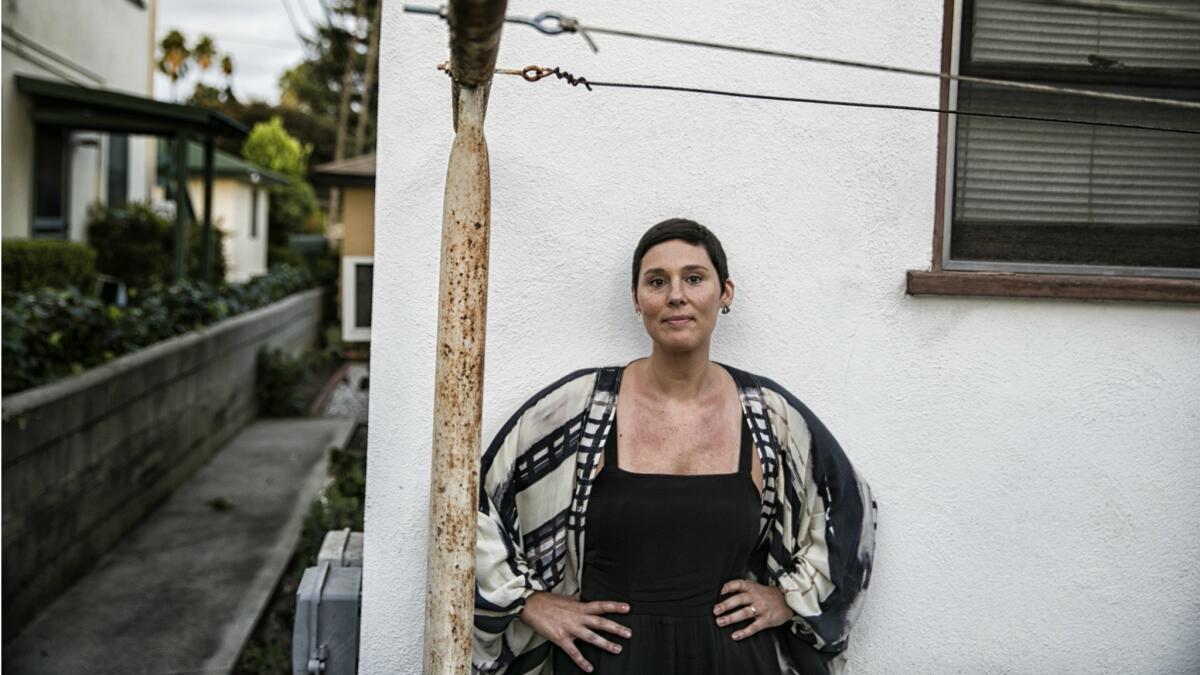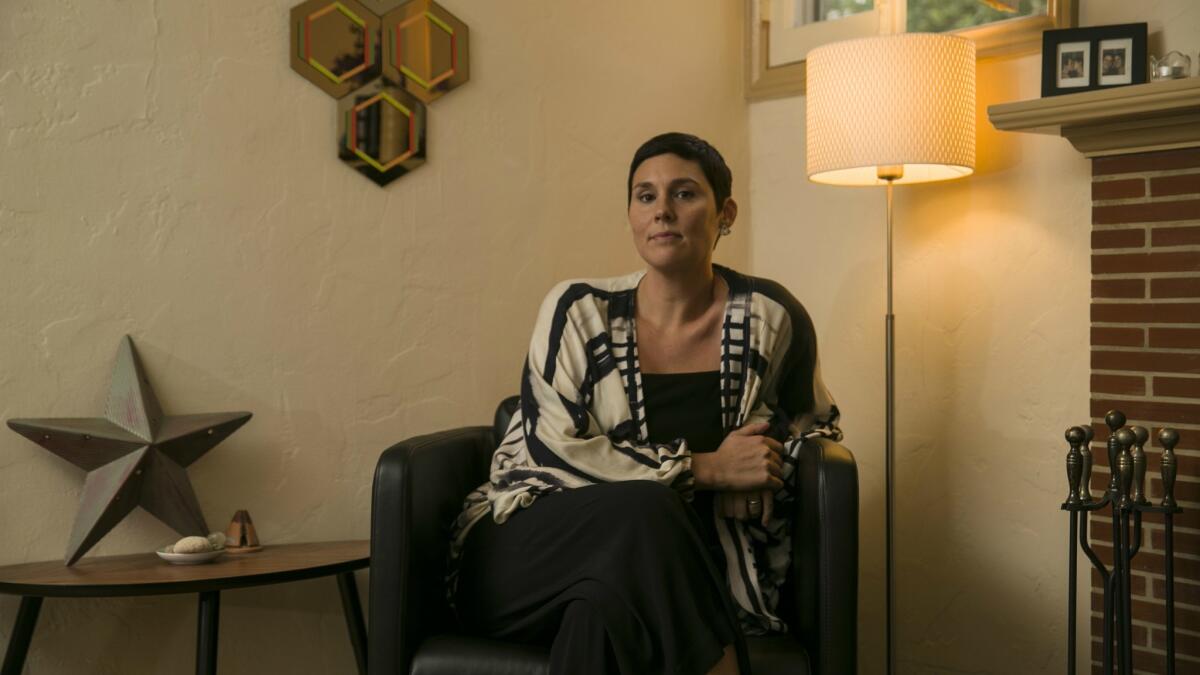Debut novelist Liska Jacobs sets a woman on the edge in ‘Catalina’

- Share via
Perched on a vista high above the city, immersed in rare, significant papers and art, Liska Jacobs had what seemed like a dream job as an assistant librarian at the Getty Research Institute, where she managed the special collections reading room. The only trouble, she realized while archiving a delicate collection of writings and letters that had once belonged to the surrealist artist Man Ray, was that it wasn’t her dream.
“I just out of the blue quit, which you don’t really do,” said Jacobs, sitting at the dining room table in her Pasadena home. Our meeting was her first interview as a published novelist, and although her hand trembled faintly as she poured fresh mint tea, she spoke with conviction about her path to writing. In rehousing Ray’s so-called Hollywood album, which includes ephemera from the time he spent living in Los Angeles, Jacobs read in his letters that he saw photography as a way to make money and that he actually wanted to paint.
“It sort of shocked me. He wrote often about hating photography,” she said. That Ray resented the work he was known for, his passions subsumed, affected Jacobs deeply. It felt like a message, asking: Would her work at the Getty be her legacy? “No,” she recalled thinking. “I’d rather live on the beach and write.”
In ‘Catalina,’ Jacobs tracks, with a sense of inevitability, the fallout of a woman with the audacity to make her own mistakes.
“Catalina,” Jacob’s riveting debut novel — part California story, part feminist social commentary — is the result of taking that plunge. She drafted the book while pursuing a master’s in fine arts from UC Riverside-Palm Desert, working as an event coordinator at the Last Bookstore and in her spare time co-editing the cult favorite Dum Dum Zine. Her book is so rooted in place — in the high-thread-count sheets of the Miramar in Santa Monica and the nearby shores of Catalina Island — that her vivid, evocative prose feels backlit by the glare off the sea. It’s California that her narrator, Elsa, returns to after the end of an affair and an untidy firing from the Museum of Modern Art in New York, and her reckless, compulsively readable unraveling takes place on Catalina Island during a tense reunion with an ensemble cast of old friends.
>>Liska Jacobs celebrates the release of “Catalina” at the Last Bookstore at 7:30 p.m. on Nov. 10.
“In Los Angeles, there’s this duality,” said Jacobs, an L.A. native who comes from a line of Hollywood sound editors on her father’s side. “It’s very plastic and built up. We don’t really keep any of our old buildings… but then right outside of it we have the Santa Monica Mountains, Griffith Park.” Attuned to the polarities of Los Angeles — nature and development, the inherent symbolism of lawns landscaped in a desert climate, of sunny bungalows built on the San Andreas Fault — Jacobs set the book in what she saw as its ultimate expression: Catalina.

“I think it’s such a strange island,” she said, referencing the touristy appeal of its only city, Avalon, in contrast to the natural beauty of Paradise Cove and the village of Two Harbors, all crucial locations in the book. “It’s a loaded place,” and a natural extension of Elsa’s identity crisis, as well as the novel’s contention that appearances can deceive. (“I like the idea of a decorative predator,” Elsa thinks on Page 1.) “Each character has their exterior, which is one way, and their interior, which is something else,” says Jacobs, who discussed her work with careful, steady focus. Her sense of the sinister lurking in paradise is bone deep. In California, she added, “there’s always ugliness to beauty.”
“Catalina’s” intelligent, beautiful narrator, Elsa, hell-bent on a booze-fueled, pill-popping undoing, would agree; she embodies the potential menace of a sharp, gilded edge. “She comes from a long line of ‘tortured-women-on-the-edge’ characters,” Jacobs said of her literary inheritance, “Jean Rhys’ heroines, Joan Didion’s Maria Wyeth.” Jacobs, who doesn’t plot outside of a mood-board and timeline pinned above her pleasantly lived-in desk (the anthologies “Writing Los Angeles” and “Seeing Ourselves: Women’s Self-Portraits” topped crooked stacks), was surprised by just how much her protagonist, in 2017, has in common with those forerunners. Today, as back then, a tortured female character runs the risk of being labeled unlikable, although Jacobs resists this: “All that we’re really saying is that [she’s] a woman with agency making choices different than our own.”
[Jacob’s] sense of the sinister lurking in paradise is bone deep. In California, she added, “there’s always ugliness to beauty.”
Some of Elsa’s choices might be considered morally bereft, but she makes them without apology. And yet despite her agency, neither her sexuality nor her rage go unpunished. In “Catalina,” Jacobs tracks, with a sense of inevitability, the fallout of a woman with the audacity to make her own mistakes. A prodigal daughter, Elsa flees the affair, only to discover that while you can never really go home again, you also can’t escape. “Women are trapped by their womanhood,” said Jacobs, “because it’s something that’s defined by whoever is in the room with them.”
Or, in “Catalina,” whoever else is on the island or manning the boat. The trip includes Robby, Elsa’s ex-husband; Charly, her childhood best friend; and Tom, their wealthy, unscrupulous sailing captain and host for the trip. Their myriad histories, flirtations and betrayals crisscross like threads of cat’s cradle.
That the novel has been praised as California noir interests Jacobs. “All I tried to do in this book is be honest,” she said. “I don’t live in a California noir.” Jacobs’ time at the Getty entered the text obliquely: She was inspired by the museum’s sense of remove and isolation, the solitude of beautiful objects behind glass. “Catalina,” Jacobs adds, “is a lot about [Elsa’s] loneliness.” Drug and alcohol abuse are part of her character’s dissolution; “sometimes she would seep too much into me,” Jacobs said. “My husband would come home from work, and I’d be having a martini and I’d have bought a pack of cigarettes.” Jacobs took to playing a certain song, “Service Bell” by Grizzly Bear and Feist, to bring her back into the atmosphere of the novel as an alternative.
To capture Catalina, Jacobs spent a week there, writing at a camping table; her current research is farther flung. “I swore to myself, if I ever sold a second book, I would place it somewhere more exotic,” she said with a laugh. “So the second book takes place in Rome and Puglia.” She’s traveled there twice in the last six months. Research trips to Italy seem a distant cry from the 50 or 60 rejections she received when querying agents for “Catalina,” or, for that matter, the chill of museum air. Writing is long, arduous work, but it’s nothing compared to the cliff dive of following your calling. “The hardest part about selling a book,” said Jacobs, “is believing in it.”
More to Read
Sign up for our Book Club newsletter
Get the latest news, events and more from the Los Angeles Times Book Club, and help us get L.A. reading and talking.
You may occasionally receive promotional content from the Los Angeles Times.








